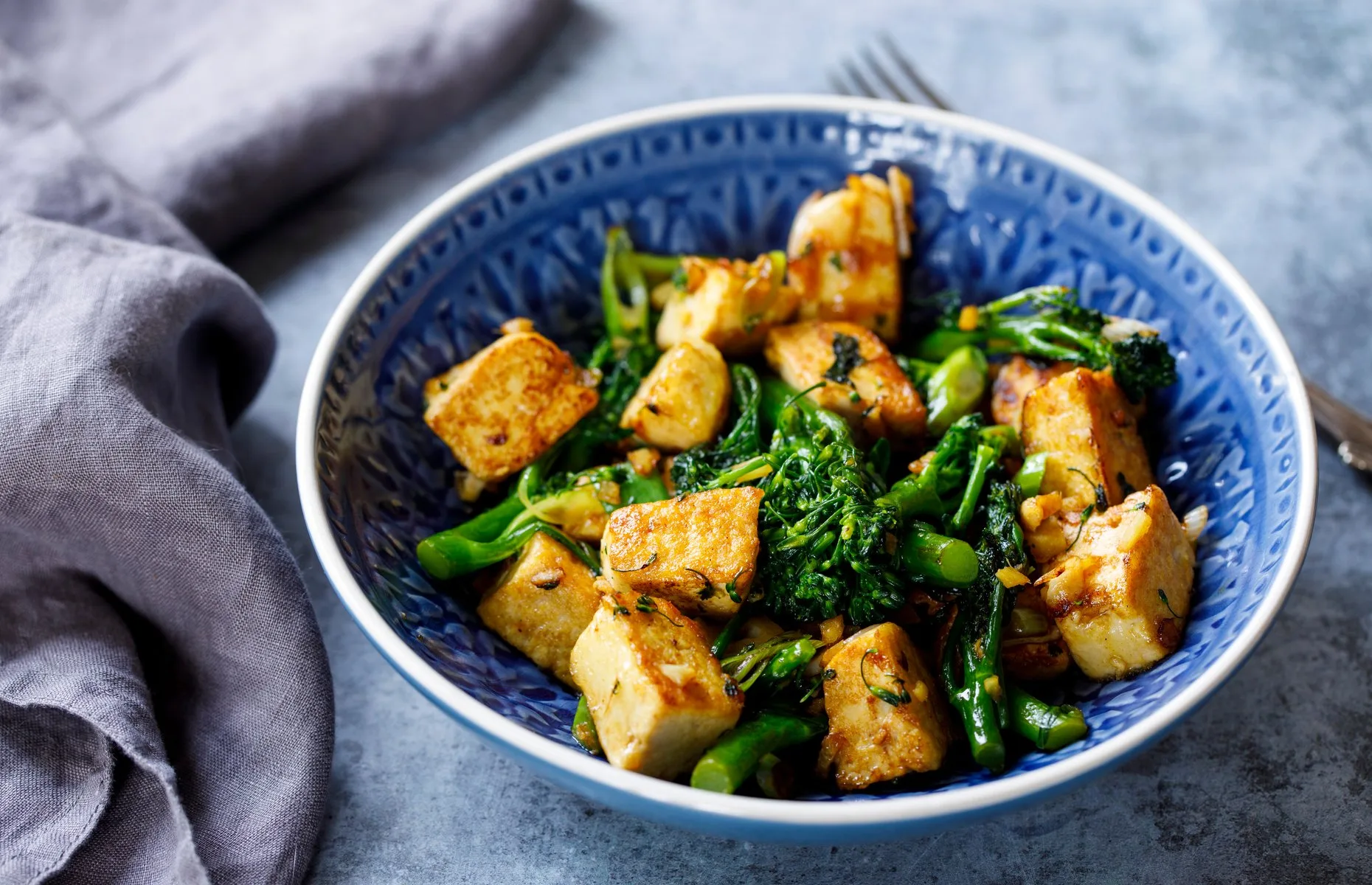As a vegan superfood and common vegetarian alternative, tofu has risen in popularity over the years. A protein-substitute, tofu is enjoyed around the world in a number of different ways.
That said, as it’s a soy product, tofu is also surrounded by a lot of controversies as a result of its potential impact on our hormonal health. That said, this article will serve to highlight the benefits, as well as address the potential risks that come from adding this ingredient to your plant-based diet.
But first, what exactly is tofu?
Originating from China, tofu is made from curdling soy milk (from soybeans) and then pressing the resulting curds into solid white blocks – a process similar to cheese making.
There are different types of tofu, ranging from soft/silken tofu to super firm tofu. The type of tofu you choose depends on the intended use as silken tofu is regularly used for desserts, soft tofu can be used in casseroles as well as soups and extra-firm tofu can be fried or roasted.
In regards to its nutritional value, as mentioned, tofu is extremely rich in protein, as well as all the essential amino acids. Additionally, the vegan superfood is low in calories and it contains iron, manganese, magnesium, calcium, selenium, potassium, vitamin B6, vitamin K, and vitamin C.
That said, tofu also contains several anti-nutrients, however soaking or cooking the soybeans before the tofu-making process can help to remove the anti-nutrients.
What are the health benefits?
1. Protective heart properties
Heart disease is still the number one cause of mortality worldwide. However, changing up your diet is one of the best ways to reduce your risk of said disease, particularly by including tofu in your diet.
For instance, soy products contain isoflavones (natural phytoestrogens found in plants), and according to research published in the American Clinical Journal of Nutrition, participants who took 50 grams of soy protein a day experienced a reduction in their risk of heart disease.
2. May reduce the risk of some cancers
According to research, tofu may help to reduce the risk of breast, digestive as well as prostate cancer.
a. Breast Cancer
Now while there’s concern around soy products and their impact on the risk of breast cancer, research published in the American Journal of Medicine found no link between soy isoflavones and increased breast cancer risk.
That said, there has been research that suggests that tofu can help to reduce one’s risk of breast cancer. For instance, findings published in the Anti-Cancer Agents in Medicinal Chemistry journal revealed that women who eat soy products at least once a week have their risk of breast cancer cut in half. Additionally, another study published in the journal, Carcinogenesis found that women who ate soy products at least once a week throughout their teenage years and adulthood faced a 24% lower risk of breast cancer, compared to those who ate soy only during their teenage years.
b. Stomach cancer
Various studies have found that a high intake of tofu can help to significantly reduce the risk of stomach cancer in both men and women (1,2).
c. Prostate Cancer
Prostate cancer is in the world. That said, research published in the BJU International journal found that men who had a high intake of tofu in their diet face a reduced risk of prostate cancer.
Additionally, tofu also contains selenium, and according to findings published in the Asian Pacific Journal of Cancer Prevention, selenium can help to reduce the risk of prostate cancer.
3. Protects bone health
As mentioned, tofu contains manganese, calcium, as well as phosphorus – three nutrients that can help to protect bone health by reducing the risk of bone loss.
Additionally, research has found that an increased intake of isoflavones was linked to higher bone density, as well as a reduction in bone loss (3,4).
4. Improves brain function
Soy products contain lecithin, and this compound helps the body produce chemicals called phosphatidic acid (PA) and phosphatidylserine (PS) – two chemicals that play a vital role in the functioning of neurons.
That said, findings published in the Journal of Alzheimer’s Disease suggested that tofu may help improve memory and cognitive function in female Alzheimer’s patients above the age of 65.
Okay, so why the concern?
Now, while tofu provides plenty of health benefits, there are a few understandable concerns around its consumption.
1. Processing
There have been initial findings that suggest that overly processed soy products may increase the risk of tumor growth.
Additionally, numerous soy products are genetically modified, and for a lot of people. GMO foods may raise concerns about food allergies, digestive problems as well as antibiotic resistance.
That said, if you are looking to eat tofu, it would be advisable to opt for the type that is less processed.
2. Thyroid concerns
According to reports found in the Journal of Pediatric Endocrinology and Metabolism, infants who are fed a soy-diet may increase their risk of thyroid problems.
That said, a report from the European Food Safety Authority (EFSA) concluded that soy and soy isoflavones pose no concerns for thyroid function.
Henceforth, it would be advisable to keep soy products away from infants, as well as those suffering from thyroid disorders such as hypothyroidism.
Tofu Recipes
If you’re struggling with including tofu in your diet, here are some of our favorite, healthy and delicious recipes.



![women [longevity live]](https://longevitylive.com/wp-content/uploads/2020/01/photo-of-women-walking-down-the-street-1116984-100x100.jpg)











One Comment